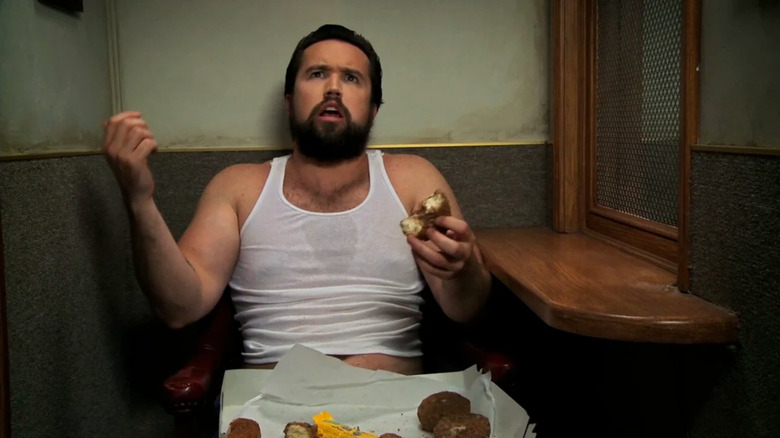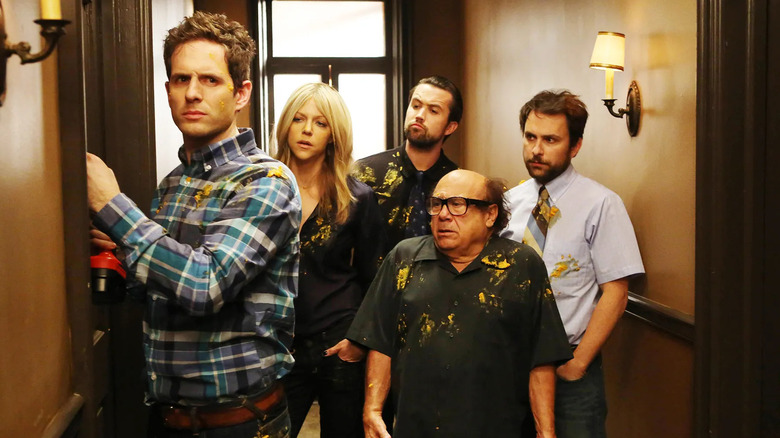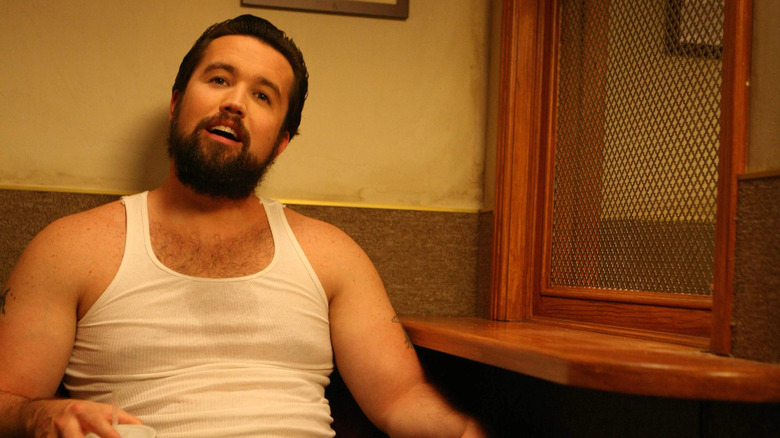Rob McElhenny Wanted The Entire It's Always Sunny In Philadelphia Cast To Gain As Much Weight As Mac
Unlike most television shows, "It's Always Sunny In Philadelphia" is at its best when the main characters are at their worst. The long-running sitcom often showcases the gang during their most heinous and devious moments, either to teach them a lesson or to exemplify just how bad they are as people. Pushing the boundaries of comedy is the show's strong suit, but that doesn't mean they aren't afraid of making amends, either. "It's Always Sunny" is great at subverting expectations with its storylines, no matter how ridiculous they turn out to be. This is especially true when Rob McElhenny undergoes a drastic transformation to introduce an overweight Mac to the series.
Although we could see subtle changes to his physique in the season prior, it was the seventh season that revealed that Mac had gained a significant amount of weight. Despite the problematic implications of injecting comedy through weight gain, McElhenny still pursued the typical self-deprecating humor the series is known for. Introducing an overweight Mac served as a means to accentuate his vanity and to mock how other shows often went in the opposite direction with their characters. Shockingly enough, there is a world in which we could've seen the rest of the gang also go through a dramatic transformation.
The gang gains weight
In an interview with Metro, Sweet Dee herself, Kaitlin Olson, revealed that Rob McElhenny originally wanted the entire cast to drastically change their appearance:
"Actually, he wanted us all to try and gain as much weight as possible, and to be fat, and he wanted Danny to get super skinny. And so, thank God, Charlie and Glenn were like, 'Ooo, I don't really know if I want to do that.' I had literally just had my second baby, and I was like, 'Uh, I just gained 30 pounds so, no.' So Rob was like, 'Fine, I'll do it myself.'"
Not only does it sound like a nightmare to pull off, but the idea would probably not have been as well-executed as it was for Mac. One of the main reasons the plan worked in the first place is due to the isolated nature of his situation. Having everyone in the gang go through a similar evolution would have been funny for a moment, but the overuse of the concept could have proved counterproductive. Instead, we get to see how just childish the gang is around him, while Mac himself displays even more vain tendencies than before.
The Mac situation
The reason for the weight gain remains a well-intentioned effort that has more to do with how other shows treat their characters. To Rob McElhenny, gaining weight was a way to make fun of the sitcom trope that saw the protagonist get in better shape as the series went on. McElhenney explained his reasoning to MTV:
"Vanity is such a huge part of television, and if you watch any average sitcom, you notice that the actors get better-looking as the years go by [...] So I realized I needed to go in the extreme opposite direction. It's always been our goal to do the opposite of what any sitcom on network television would do, so that's what I did."
Unceremoniously dubbed "Fat Mac," the character gained infamy for his appearance during the seventh season. The comedic tendency was to show just how disillusioned he was about his body, whether it was visiting a priest with donuts or carrying a bag of chimichangas around the bar. McElhenney eventually transformed his body once more, drastically dropping in weight and gaining copious amounts of muscle. For Mac, however, it's always been about vanity. His obsession with superficial values also plagues the rest of the gang, but Mac serves as the benchmark.
Since its inception, the main goal of "It's Always Sunny in Philadelphia" has been to create comedy out of despicable people. It may have hit a few speed bumps along the way, but the comedic qualities that characterize the series have never wavered.


